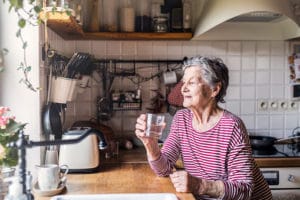Ontario’s Chief Medical Officer of Health is strongly urging those over the age of 70 or those with weakened immune systems or medical conditions to stay at home and self-isolate.
Why is this so important?
Seniors, people with weakened immune systems and chronic medical conditions are more at risk for severe outcomes from COVID-19. These measures are meant to help protect our most at-risk populations.
Please note: if you have symptoms of COVID-19, have recently travelled or come in contact with a confirmed case of COVID-19, self-isolation will look different for you than for an at-risk person looking to protect their health. Please refer to https://ckphu.com/prevent-the-spread/ for more details.
What are some things seniors should do?
If you’re a senior or a person with a weakened immune system, it is important for you to…
- Stay home to lower your risk of coming across someone who is ill in the community
- Postpone nonessential visits, for example from friends and family
- Avoid public transportation, taxis or rideshares
- Avoid public places
- Only leave your home for essential reasons (for example for a scheduled doctor’s appointment)
- If you do go into the community, always keep a physical distance of at least 2 metres or 6 feet from other people
- Always practice good hygiene by washing your hands, sneezing or coughing into your elbow or a tissue, and avoid touching your face with unwashed hands
- Disinfect frequently touched surfaces
- Seek services over the phone or internet and ask for help from friends, family or neighbours with essential errands. www.letstalkfood-ck.com/ has a list of meal and grocery delivery services and emergency food providers that you can use
- Check with your pharmacy to see if they will deliver any needed medications and supplies. You might want to review your medications by phone with your pharmacist or healthcare provider too.Be sure to discuss any side effects that you might be experiencing, such as dizziness or loss of balance.
- Get the help you need. If you’d rather get help from a Community Navigator over the phone, you can call 226.312.2025 x 4852 or x 4853. They will provide you with contact information or referrals for available services
- Check in with your health care provider who can let you know when it is safe to leave
You might be experiencing higher than usual levels of stress. Fear and anxiety about the COVID-19 pandemic can be overwhelming and cause strong emotions. Managing your health is very important during these extraordinary times.
Here are some things you can do to cope with stress:
- Take breaks from watching, reading, or listening to news stories and social media. Focus on the facts and be aware with care. Hearing about the pandemic repeatedly can be upsetting.

- Take care of your body. Take deep breaths, stretch, or meditate. Try to eat healthy, well-balanced meals, exercise regularly, get plenty of sleep, and avoid alcohol and drugs.
- Make time to unwind. Try to do some other activities you enjoy such doing crossword puzzles and creating art pieces.
- Socially connect with others creatively – Talk with people over the phone or video chat. Talking with a trusted person about your concerns and how you are feeling can be helpful. NeighbourLink has a “Phone Buddy” program available if you or someone you know is socially isolated and might need a hand or could use a phone call or two every day!
- If you or someone you know needs support, call the Mental Health First Response Service available 24/7 in Chatham Kent at 1-866-299-7447
A practical resource that you can access on CK Public Health’s website is Exercises at the Kitchen Sink. This online booklet and YouTube video series will guide you through seven exercises that you can do right at home to improve muscle strength, balance, endurance and flexibility. Being active and doing exercises, even during the COVID-19 pandemic, can help you sleep better and improve your mood. The booklet also covers topics like medication, healthy eating, hydration, home safety and what to do if you have a fall…all important topics to help you manage your health, and keep safe and independent!
Exercises at the Kitchen Sink You Tube Videos:
Part 1: https://www.youtube.com/watch?v=xO0gxu03WCs
Part 2: https://www.youtube.com/watch?v=N4okjAxDvnU
We are all in this together, and looking out for one another will make things easier. We must not confuse physical distancing with being unavailable, detached, or isolated to the point where it can harm others or ourselves. Use creative ways to connect with other seniors and vulnerable populations, so that we are all looking out for one another. Reach out to family members and friends for help with getting the things you need to stay healthy and safe.
As always, www.ckpublichealth.com has up-to-date information about COVID-19. If you don’t have internet access and have concerns, you can call public health’s dedicated COVID-19 intake line 519.355.1071 x 1900
Sources:
COVID-19 What Older Adults Need to Know Centre for Disease Control https://www.youtube.com/watch?v=TjcoN9Aek24



